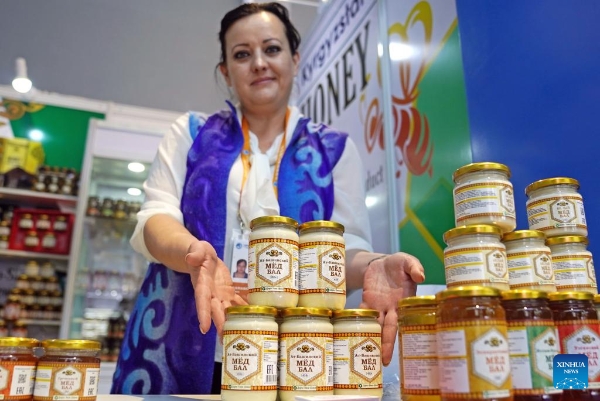
 0 Comment(s)
0 Comment(s) Print
Print E-mail Xinhua, November 2, 2024
E-mail Xinhua, November 2, 2024

An exhibitor displays honey products from Kyrgyzstan at the 6th China International Import Expo (CIIE) in east China's Shanghai, Nov. 7, 2023. [Photo/Xinhua]
The China International Import Expo (CIIE), the world's first national-level import-themed expo, is about to be held for the seventh consecutive year in Shanghai, with overseas enterprises gathering to take the pulse of the Chinese market.
Scheduled to be held from Nov. 5 to 10, the 7th CIIE has attracted participants from 152 countries, regions and international organizations, and achieved a new record with 297 Fortune Global 500 companies and industry leaders set to attend.
The previous six editions saw nearly 2,500 new products, technologies and services make their debuts, with combined intended turnover reaching over $420 billion.
The CIIE serves to showcase China's major opening-up measures and confidence, and to share China's new development opportunities with other countries. It has become a platform for high-level opening up and a public good for the whole world.
China has continued to roll out policies to spur foreign trade growth and attract foreign investment, cultivating new international competitive advantages and achieving mutual benefits with other countries.
On Oct. 25, the country issued a guideline to promote the experience in aligning some eligible free trade zones and the Hainan Free Trade Port with high-standard international economic and trade rules.
The eligible FTZs are in Shanghai, Guangdong, Tianjin, Fujian and Beijing. The pilot measures, which will be replicated in other FTZs or even nationwide, cover six aspects: trade in goods, trade in services, digital trade, personnel entry, business environment, and risk prevention and control.
China has built 22 pilot FTZs, covering coastal, inland and border areas, contributing about 20% of the country's total foreign investment and import-export volume. Foreign trade of the FTZs expanded by 11.99% year on year in the first three quarters of 2024.
Continuous efforts have been made to lower tariffs. In September, China announced it would give all the least developed countries having diplomatic relations with the country zero-tariff treatment for 100% tariff lines starting from Dec. 1 this year.
China also keeps rolling out policies to nurture fertile ground for foreign investors. The new edition of the national negative list for foreign investment took effect on Friday, scrapping the two remaining items in the manufacturing industry on the previous list.
The items on the latest negative list, specifying fields off-limits to foreign investors, have been further slashed to 29.
This fully demonstrates China's active willingness to expand mutual benefits and a clear attitude to supporting economic globalization, said Jin Xiandong, an official with the National Development and Reform Commission, adding that further efforts will be made to improve the level of foreign investment liberalization and facilitation, and to optimize service for foreign-invested enterprises.
Besides the manufacturing sector, China is also pushing forward broader and deeper opening up in the service sector.
China announced in September that it would allow the establishment of wholly foreign-owned hospitals in certain cities and regions, including Beijing, Tianjin, Shanghai, Nanjing, Suzhou, Fuzhou, Guangzhou, Shenzhen and throughout the island of Hainan.
In October, the country decided to allow foreign investors to operate wholly-owned businesses such as internet data centers and engage in online data processing and transaction processing in certain areas as part of a pilot program to expand opening up in value-added telecom services.
A total of 42,108 new foreign-invested firms were established across China in the first nine months of 2024, up 11.4% year on year. Notably, foreign direct investment inflows into medical equipment and instrument manufacturing surged 57.3%, while inflows into computer and office device manufacturing grew by 29.2% during this period.
Opening up to the outside world is not just a matter of "opening the door," but, more importantly, is actively aligning with international economic and trade regulations as well as other high-standard rules, said Zhang Bin, deputy director of the Institute of World Economics and Politics at the Chinese Academy of Social Sciences.
Zhang underlined the need to enhance synergy between the domestic and international markets as well as resources to constantly cultivate and consolidate new advantages in international economic cooperation and competition.